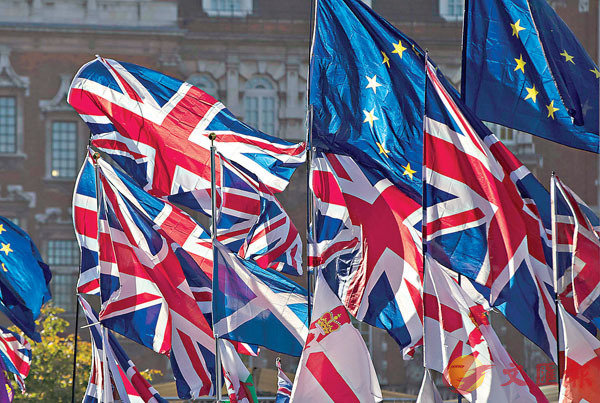 ■世貿各成員國關注英國脫歐帶來的問題。 資料圖片
■世貿各成員國關注英國脫歐帶來的問題。 資料圖片【原文】下文摘錄自香港《文匯報》11月16日報道:
英國脫歐(Brexit)僵局(deadlock)遲遲未解決,世界貿易組織(WTO)舉行會議,成員國關注英國脫歐對國際貿易活動的影響,澳洲更要求英國及歐盟(EU),就脫歐僵局對澳洲出口(export)帶來的影響賠償(compensation),以及須確保外國企業在英國脫歐後,不會被拒絕進入市場,獲美國、新西蘭、加拿大、烏拉圭(Uruguay)及中國等其餘14國家支持。
今次會議焦點放在歐盟目前向進口貨品(import)設置的「關稅配額」(tariff ratequotas)。根據世貿規定,成員國可透過關稅配額,讓主要為農產品的商品,在限額下減免進口關稅,更容易進入歐盟巿場,例如澳洲農民向歐盟國家銷售牛肉時,可藉着配額減免關稅,賺取更大盈利。目前歐盟會統一分配所有歐盟成員國的配額,但在英國脫歐後,英國將自行分配其配額,令彼此的配額計算方式有差異(discrepancy),非歐盟國家憂慮,情況將導致外國企業更難進入歐盟和英國市場。
澳洲代表表示,英國脫歐問題令關稅配額制度變得複雜,由於脫歐限期在今年3月、4月及10月幾度推遲,每逢臨近期限時,澳洲牛肉出口商便因未確定能否使用關稅配額,減少向歐盟輸出牛肉,以致蒙受損失,尤其是10月最近一次延遲,更嚴重打亂聖誕出口。澳洲批評英國多次延遲脫歐,嚴重影響澳洲企業向歐盟出口農產品,要求歐盟和英國就事件向受影響國家賠償。
其他世貿成員國亦警告,在英國脫歐後,歐盟和英國或彼此耗盡對方的進口關稅配額,限制其他國家的進口。美國代表在聲明中直指,英國脫歐後,非歐盟國家將遭到排擠(ostracize),嚴重影響美國豬肉及紅酒出口。新西蘭(New Zealand)亦認為,成員國難以估計英國脫歐後,歐洲國家如何分配進口配額,要求英國及歐盟承諾確保外國企業可進入當地市場,或增加現有配額。
巴西(Brazil)亦關注英國和歐盟達成的脫歐協議中,有關北愛爾蘭(Northern Ireland)邊境的安排或違反世貿反歧視原則。據悉巴西不滿在協議下,北愛爾蘭和英國其他地區之間的貨物無需接受嚴格檢查,或令一些貨物能在英國和歐盟之間免關稅進出口,對其他國家不公平。
15 countries file WTO complaint asking for Brexit trade compensation from UK and EU
【譯文】While the UK's Brexit deadlock remains unresolved, during negotiations at the World Trade Organization (WTO) recently, the member states were concerned about the negative impact of Brexit on international trade.
Australia even demanded compensation from the UK and EU for Brexit-related disruption to the Australian export industry, and requested that market entry by foreign countries should not be blocked after Brexit.
The claim won immediate support from 14 countries including the US, New Zealand, Canada, Uruguay and China.
The focus of the meeting was on the "tariff rate quotas" (TRQs) set by the EU on the imports of non-EU countries. According to the EU rules, the member states can make use of the TRQs scheme to impose lower or reduced duties on particularly the agricultural imports, allowing them to enter the EU market more easily.
For example, the Australian farmers selling beef to the EU under such scheme would enjoy reduced tariffs, making their business far more profitable.
The allocation of TRQs is currently centrally coordinated by the EU, but the UK is likely to allocate the quotas on its own after Brexit, potentially leading to a discrepancy in the calculation. Therefore, the non-EU countries might worry that the situation would make it more difficult for foreign enterprises to enter the EU and UK market.
The representatives of Australia said that the Brexit issue had complicated the tariff quota system.
Since Brexit had been postponed several times in March, April and October, Australian beef exporters who could not secure enough quotas could only reduce the amount of meat exports to EU and thus suffered economic losses, and the industry even faced great disruption in Christmas time due to the recent delay of Brexit in October.
Australia criticized the UK for delaying Brexit which caused adverse impact to Australian companies in exporting agricultural products to the EU, and demanded compensation from the EU and UK for all affected countries.
Other WTO members warned that the EU and UK might use up each other's tariff quotas and restrict imports from other countries. The US pointed out in a statement that non-EU countries would be ostracized after Brexit and this could severely hit its sales of pork and wine.
New Zealand also argued that it would be difficult for member states to estimate how would the import quotas be allocated by European countries after Brexit, and requested the UK and EU to ensure that foreign countries would not be blocked from entering the local markets or increase the existing quotas.
With regard to the agreement reached by the UK and EU, Brazil had also raised a concern about the plans for customs procedures between Northern Ireland and the UK, saying that it could breach the WTO's rules against discrimination. It was reported that the Brexit plans allowed only limited checks on goods between Northern Ireland and the rest of the UK, and provided an opportunity for goods to travel between Northern Ireland and other regions of the UK without tariffs, making it unfair to other countries.■龐嘉儀
Q&A
1. 「英國脫歐公投」(Brexit vote)是於何時舉行的?
2. 脫歐日期被三次推遲,如今最新的日期定於何時?
3. 反對歐洲一體化的意識形態稱為什麼?
4. 歐盟現時有多少個成員國?
Answer
1. 2016年6月23日
2. 2020年1月31日
3. 歐洲懷疑主義(Euroscepticism)
4. 28個

